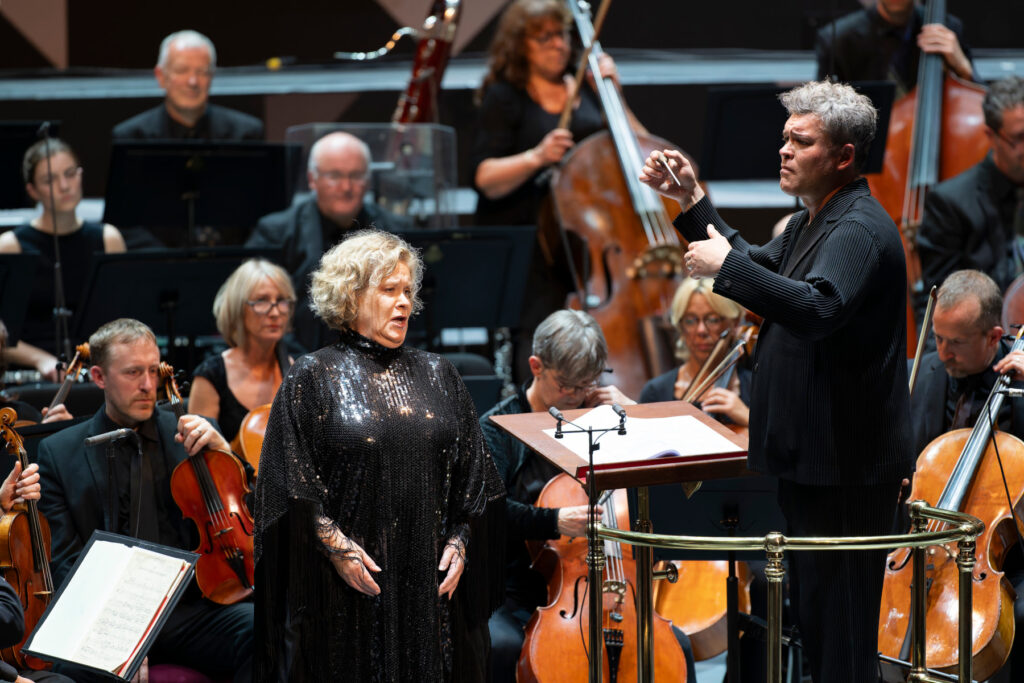This was a riveting concert. Brahms (in his most enigmatic of symphonies), Schoenberg (in one of his lushest of scores) and Mahler in one of his most profound of song cycles are works separated by just twenty-four years (albeit an additional forty-three if we include Schoenberg’s revision to Verklärte Nacht). And yet, these are works of enormously different contrast; another, less perceptive, conductor might have made this much less obvious than Ryan Wigglesworth with the BBC Scottish Symphony Orchestra.
Mahler’s Kindertotenlieder, written between 1901 and 1904, falls between three of his symphonies – the Fourth, Fifth and Sixth and somewhat inhabits the worlds of all of them. But Kindertotenlieder also overlaps the orchestral setting of Rückert Lieder. Over almost half an hour, the songs have a limited focus – on mortality, specifically on the death of children – but the poetry is strikingly powerful, too. Loss and grief is eventually achieved in acceptance and reaffirmation, and as so often in Mahler it appears on the horn in the orchestra.
Alice Coote was a gripping soloist in these songs. In ‘Nun will die Sonn’ so hell aufgeh’n’ the accents of hope that the sun will rise out of the darkness and shadows of the night came through wonderfully. There was a longing passion that yielded little to the darkness in her voice in the second song, ‘Nun she’ ich wohl, warum so dunkle Flammen’, with its unsettling contours that tethered the voice to the orchestra. Harps (perhaps recalling the slow movement of Mahler’s Fifth) rippled through the orchestra, yet the image here was all in Coote’s intensely sung final two last lines: “Was dir nur Augen sind in diesen Tagen:/In künft’gen Nächten sind es dir nur Sterne.”

In ‘Wenn dein Mütterlein’ the desolation and emptiness left by a father’s daughter looked backwards, the regret and anguish in Coote’s voice richly layered. In the fourth song, memory is again re-imposed, but here Coote was unusually rapturous, the ecstasy inescapable: “Bald warden sie wieder nach hause gelangen!”, the hints of sunshine and hope appearing with an iridescence of tone and warmth. The storm that opens the fifth song, ‘In diesem Wetter, in diesem Braus’, found Cootes moving towards acceptance of the lost children’s peace, the “Unglück” (misfortune) that had befallen her in the first stanza finally resolved into a lasting serenity. Cootes was magnificently radiant, deeply moving – that sense of realization finally attained; D major appeared in blazing sunlight.
Ryan Wigglesworth and the BBC Scottish Symphony Orchestra had played superbly, never overwhelming Coote (although this is not an overscored work).
Brahms’s Third Symphony – autumnal, but not without stormy moments – is the most difficult of the symphonies to bring off; Arturo Toscanini never quite managed to make a convincing recording of it. If Ryan Wigglesworth did achieve something in a performance that was full of surprising touches it came down to several things. There was the wonderful clarity, in part down to antiphonal violins where the elaborate details came through with such magical effect. The Allegro con brio can be lugubrious, even a tad dense, but Wigglesworth, even if tempo weren’t overly brisk, tended to make the strings play their notes short. Rhythms were often dotted with precision; elegy (in the Poco allegretto, for example) obtained through gorgeous tone in the lower strings. The woodwind playing was exceptional. The oboes in the second movement had wonderful tone-colouring; the interplay between the clarinet and bassoon melted together into a single shadow. Best of all was the Allegro which was thrilling: the music flared like a tempest, rhythms were handled with relentless energy. The strings swept and scuttled, and yet sounded storm-tossed; a trombone was hymnal in its solemnity. This turbulence was whipped into submission by the lamentation of the oboe – a gentle breeze settling over the orchestra. It was all rather flawlessly done.
Verklärte Nacht had a rather different sound (still with antiphonal violins). The drama and intensity of this work – linked to its sense of anguish and horror – shares some common threads with Mahler’s Kindertotenlieder, notably in the progression of the music from bleakness and darkness to hope and jubilation. There was none of the Karajan power here – that sheer monumental scale, or the sound that he sculptured out of the Berlin Philharmonic strings with such astonishing tension. But Wigglesworth dug deep; the instability in this music was often shatteringly clear, and the double basses in particular had a penetrating roar to them that probed deep within the orchestra and beyond. Delicacy towards the end of the work was superbly handled, the shading of dynamics so carefully done – the acoustic of the hall perhaps making this music disappear a little more mysteriously than it is supposed to, however. Exceptional none the less.
Marc Bridle
Johannes Brahms – Symphony No. 3; Arnold Schoenberg – Verklärte Nacht; Gustav Mahler – Kindertotenlieder.
BBC Scottish Symphony Orchestra; Ryan Wigglesworth – conductor; Alice Coote – mezzo-soprano.
Royal Albert Hall, London, 25 July 2024
Top image: Alice Coote.
All photos by Andy Paradise courtesy of the BBC.